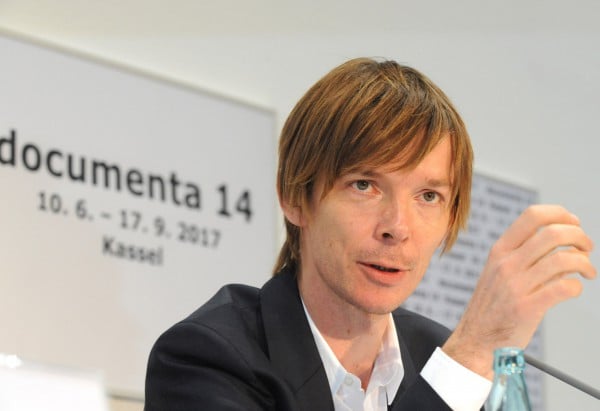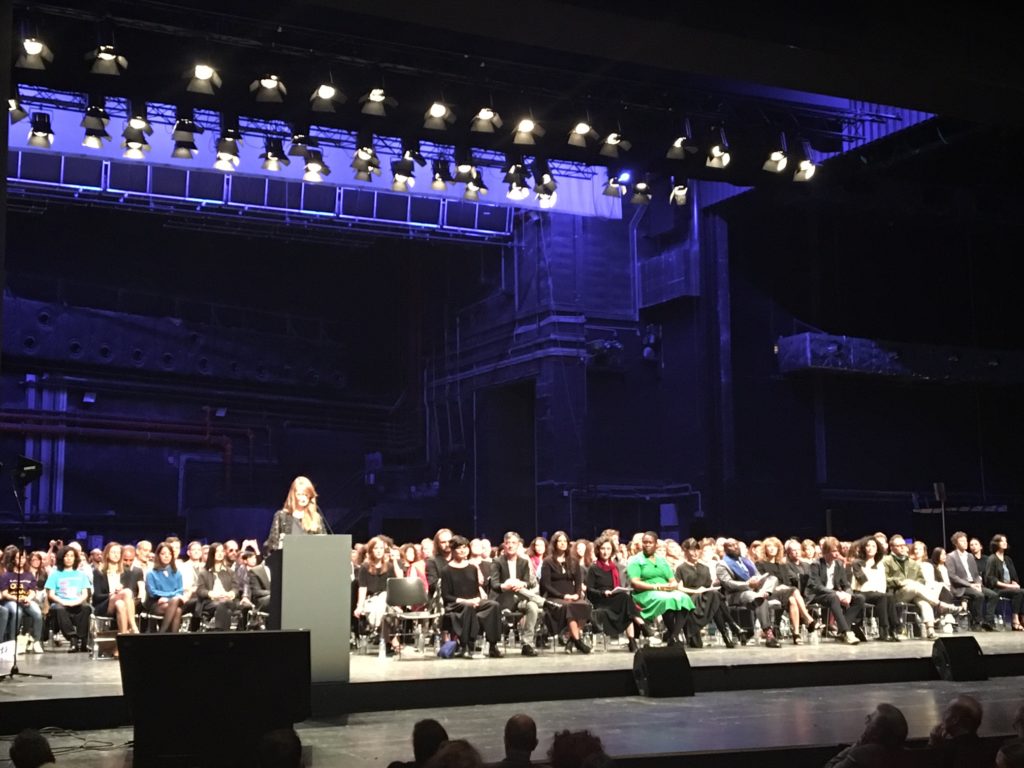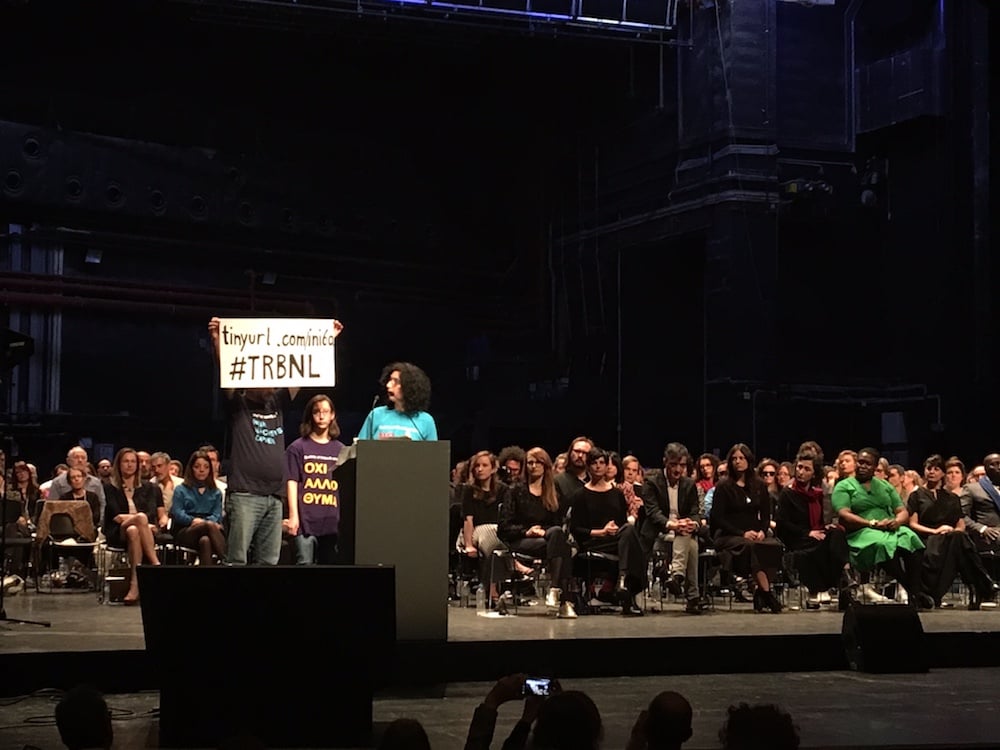Art World
The Tao of Szymczyk: documenta 14 Curator Says to Understand His Show, Forget Everything You Know
Despite the secrecy, the presentation included intense and emotional moments.

Despite the secrecy, the presentation included intense and emotional moments.

Hili Perlson

At a jam-packed press conference for the most highly anticipated event in art this year, documenta 14—which opens for professional previews today in Athens—artistic director Adam Szymczyk and his team maintained their approach: keeping statements broad and elusive until the very last minute.
As more information about the program was being released in trickles since the beginning of April—in a succession of long announcements in Greek, German, and English—it became clear that, at least the Athens leg of the quinquennial will be dominated by performances, actions, sound art, and texts, rather than visual offerings.
The press conference opened with a dramatic performative moment.
Rather than releasing an artist list, the curtain went up to reveal the entire team of curators and participating artists sitting on stage. Like a choir, the many dozens performed with their voices the “continuum” from Jani Christou’s Epicycle sound piece, which informed and inspired, as curators told the press, the process of thinking and working on documenta 14.
“We believe that unlearning everything we believe to know is the best beginning,” Szymczyk began, specifying, like a zen master, that “the great lesson is that there are no lessons.”
Reiterating that the audience is expected to participate, the curator stated that “the current state of affairs shows we need to mobilize collectively and act,” before adding, solemnly: “We will be judged for the outcome of this, which is in our hands but also in your hands.”
Szymczyk also clarified to any confused guests that they weren’t attending “a VIP preview.”
However, he did offer a very useful piece of advice, or set of instructions, as to how to experience the show: “Visit the exhibition according to geography, don’t run to the big venues first. This will give you some insight into how we worked on the projects.”
We have been warned: in recent interviews, Szymczyk did in fact insist that “Learning from Athens,” as the 100-day exhibition is titled, will have to be experienced with fresh eyes to be understood.
“In my opinion, an exhibition should be an experience, without great programmed expectations,” he said. But that’s not entirely true, at least not as far as the curatorial team is concerned, who indeed have big expectations—from the audience.
“There is a large untapped potential when visitors come together for an exhibition—a political potential,” Szymczyk said.

The documenta 14 press preview. Photo Hili Perlson.
The opening-week program spans a list of performances too long to reprint, but some highlights will surely be provided by the likes of Sanja Iveković, who is creating a “creative oral document” at Avdi Square every day from 11 am to 9 pm; Pope.L, whose multi-part performance will happen across “five to six public spaces” over five hours; or sex activist Annie Sprinkle, who also participated in the pre-program in Athens with a lecture on the pleasures of water.
And on Saturday, the Syrian Expat Philharmonic Orchestra, together with the Athens State Orchestra, will perform the heart-rending Symphony of Sorrowful Songs by Henryk Górecki.
Focusing on the socio-political themes that shape Europe today—with the specter of nationalism looming high over upcoming elections in France and Germany—documenta 14 will focus on immigration, displacement, and the catastrophe that informed documenta’s creation in the first place: World War II and the Holocaust.
Lithuanian-born Jonas Mekas will present photographs, in both cities, that he took between 1945-48 when he was living in a displaced persons camp in Kassel. And in Kassel this June, Maria Eichhorn will present a work that takes its cue from the Gurlitt hoard, looking at the “Expropriation of Europe’s Jewish Population.”
The urgency of political conditions was repeated by the different curators who have worked on documenta 14, including Hila Peleg, who curated a rich film program; Quinn Latimer, editor of all documenta 14’s publications; and Spanish curator Paul B. Preciado, who organized the pre-program that has been taking place in Athens since October, “Exercises in Freedom: the Parliament of Bodies.”

Members of the Society of Friends of Halit Yozgat, holding up a sign with a tiny url. Photo Hili Perlson.
Preciado called to the stage three members of the Society of Friends of Halit Yozgat, who got a standing ovation.
Yozgat was murdered in Kassel in 2006, one of the victims in the series of murders committed by the National Socialist Underground, or NSU, carried out across Germany, uninterrupted, until the neo-Nazi group was uncovered in 2011. Questions about the degree to which the German intelligence service, the BND, was involved, remain unanswered still.
Currently in Germany, spearheaded by Eyal Weizman’s forensic architecture, the investigation into the NSU murders is taking another turn. The speakers on stage, friends and family of Yozgat, urged the audience to follow the developments on a tiny url or at #trbnl.
This unusually affecting press conference, wittingly or not, took place on April 6, the date that 76 years ago, marked the invasion of Nazi Germany into Greece and Yugoslavia, in 1941.
Between Athens and Kassel, until the fall, the exercise and the unlearning will continue.
documenta 14, “Learning from Athens” runs in Athens from April 8–July 16, 2017.